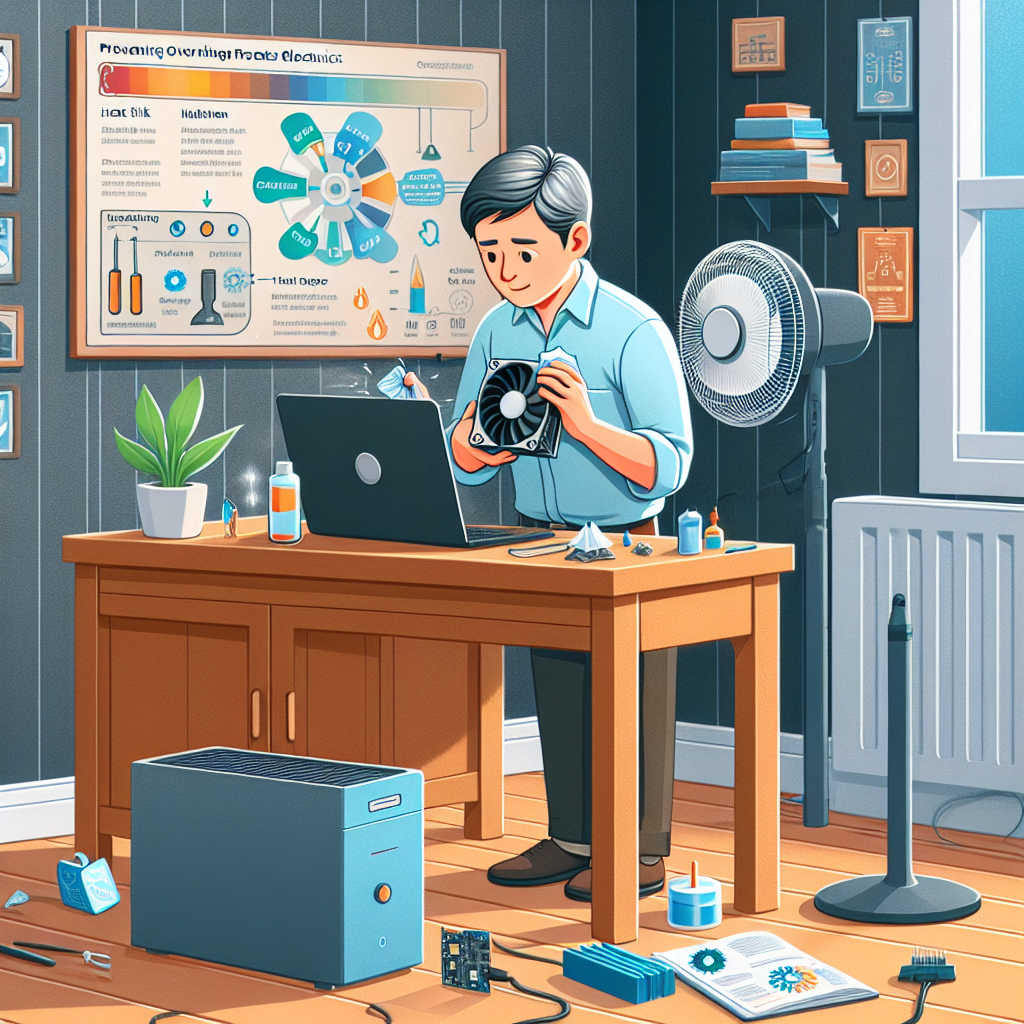No products in the cart.

How to Prevent Overheating and Protect Your Electronics from Damage
5 Tips for Keeping Your Electronics Cool in the Summer Heat
As the summer heat intensifies, it’s not just our bodies that feel the effects. Our electronic devices are also at risk of overheating and potentially getting damaged. With the increasing reliance on technology in our daily lives, it’s important to take steps to protect our electronics from the scorching temperatures. Here are five tips for keeping your electronics cool in the summer heat.
1. Keep them out of direct sunlight
One of the most common causes of overheating in electronics is exposure to direct sunlight. The sun’s rays can quickly heat up the surface of your devices, causing them to work harder and potentially leading to damage. To prevent this, make sure to keep your electronics out of direct sunlight. If you’re using a laptop or tablet outdoors, try to find a shaded area or use an umbrella to block the sun’s rays. When indoors, keep your devices away from windows or any other sources of direct sunlight.
2. Use a cooling pad or stand
For laptops, using a cooling pad or stand can be an effective way to prevent overheating. These devices are designed to provide additional airflow to the bottom of your laptop, helping to dissipate heat and keep it cool. They also elevate the laptop, allowing for better ventilation. Cooling pads and stands come in various sizes and styles, so you can easily find one that fits your laptop and budget.
3. Clean and dust your devices regularly
Dust and debris can accumulate on the surface and inside of your electronic devices, obstructing airflow and causing them to overheat. To prevent this, make sure to clean and dust your devices regularly. Use a soft, dry cloth to wipe away any dust or debris from the surface. For hard-to-reach areas, you can use compressed air to blow away any dust. It’s also a good idea to clean the vents and fans of your devices to ensure proper airflow.
4. Avoid using your devices on soft surfaces
Using your laptop or other devices on soft surfaces like beds, couches, or carpets can also contribute to overheating. These surfaces can block the vents and fans of your devices, preventing proper airflow and causing them to work harder. Instead, try to use your devices on hard, flat surfaces like a desk or table. If you must use them on a soft surface, consider using a lap desk or a hardcover book as a makeshift surface.
5. Give your devices a break
Just like us, our electronic devices need a break from the heat. If you’re using your laptop or other devices for an extended period, make sure to give them a break every now and then. Shut them down or put them in sleep mode to allow them to cool down. This will not only prevent overheating but also help prolong the lifespan of your devices.
In addition to these tips, it’s also important to keep an eye on the temperature of your devices. Most electronics have a maximum operating temperature, and if it exceeds that, it can lead to permanent damage. If you notice that your device is getting too hot, turn it off and let it cool down before using it again.
In conclusion, the summer heat can be harsh on our electronic devices, but with these tips, you can prevent overheating and protect them from damage. Remember to keep them out of direct sunlight, use a cooling pad or stand, clean and dust them regularly, avoid using them on soft surfaces, and give them a break from the heat. By taking these simple steps, you can ensure that your electronics stay cool and functional throughout the summer months.
The Importance of Proper Ventilation for Electronic Devices

In today’s digital age, electronic devices have become an integral part of our daily lives. From smartphones to laptops, we rely on these devices for communication, work, and entertainment. However, with the increasing use of electronic devices, the risk of overheating and damage to these devices has also risen. This is why proper ventilation for electronic devices is crucial in preventing overheating and protecting them from damage.
Electronic devices generate heat while in use, and if this heat is not dissipated properly, it can lead to overheating. Overheating can cause serious damage to the internal components of the device, leading to malfunctions and even permanent damage. This is why it is essential to ensure that your electronic devices have proper ventilation to prevent overheating.
One of the main reasons for overheating in electronic devices is the lack of airflow. When electronic devices are placed in closed spaces or covered with objects, the airflow is restricted, and the heat generated by the device cannot escape. This trapped heat can cause the device to overheat and potentially damage its internal components. Therefore, it is crucial to keep electronic devices in well-ventilated areas with enough space around them for proper airflow.
Another factor that contributes to overheating is the accumulation of dust and debris in the device’s vents. Over time, dust and debris can build up in the vents, blocking the airflow and causing the device to overheat. Regularly cleaning the vents of your electronic devices can help prevent this issue. You can use a can of compressed air or a soft brush to remove any dust or debris from the vents. This simple maintenance task can go a long way in preventing overheating and prolonging the life of your electronic devices.
Furthermore, it is essential to pay attention to the placement of your electronic devices. Placing them on soft surfaces such as beds, carpets, or pillows can block the vents and restrict airflow, leading to overheating. It is best to place electronic devices on hard, flat surfaces that allow for proper ventilation. Additionally, avoid placing them near sources of heat, such as radiators or direct sunlight, as this can also contribute to overheating.
Proper ventilation is not only crucial for preventing overheating but also for maintaining the performance of your electronic devices. When electronic devices overheat, they tend to slow down and may even freeze or crash. This can be frustrating, especially when you are in the middle of an important task. By ensuring proper ventilation, you can prevent your devices from overheating and maintain their optimal performance.
Moreover, overheating can also affect the battery life of your electronic devices. High temperatures can cause the battery to drain faster, reducing its overall lifespan. This is why it is essential to keep your devices in well-ventilated areas to prevent overheating and preserve the battery life.
In conclusion, proper ventilation is crucial for preventing overheating and protecting your electronic devices from damage. By keeping your devices in well-ventilated areas, regularly cleaning the vents, and paying attention to their placement, you can ensure that they operate at their best and have a longer lifespan. Remember, prevention is always better than cure, and taking these simple steps can save you from the hassle and cost of repairing or replacing your electronic devices due to overheating. So, make sure to give your electronic devices the ventilation they need to function properly and last longer.
Protecting Your Electronics from Overheating: Common Mistakes to Avoid
Electronics have become an integral part of our daily lives. From smartphones to laptops, we rely on these devices for communication, work, and entertainment. However, with the increasing use of electronics, there is also a rise in the risk of overheating and damage. Overheating can cause serious damage to your electronics, leading to costly repairs or even complete failure. In this article, we will discuss common mistakes to avoid in order to protect your electronics from overheating.
One of the most common mistakes people make is placing their electronics in direct sunlight. While it may seem like a convenient spot to charge your phone or use your laptop, direct sunlight can quickly heat up your device and cause damage. The sun’s rays can also cause the screen to fade or even crack. It is important to keep your electronics away from direct sunlight and in a cool, shaded area.
Another mistake people make is using their electronics on soft surfaces such as beds or couches. These surfaces can block the device’s ventilation system, causing it to overheat. The soft material can also trap heat, making it difficult for the device to cool down. It is best to use your electronics on a hard, flat surface that allows for proper air circulation.
Leaving your electronics in a closed, confined space is also a common mistake. For example, leaving your laptop in a closed bag or backpack can cause it to overheat. The lack of air circulation can quickly heat up the device, leading to damage. It is important to store your electronics in a well-ventilated area, especially when they are not in use.
Using your electronics while they are charging is another mistake that can lead to overheating. When a device is charging, it generates heat, and using it at the same time can cause it to overheat. It is best to let your device charge fully before using it, or at least avoid using it while it is charging.
Many people also overlook the importance of cleaning their electronics regularly. Dust and debris can accumulate in the device’s ventilation system, hindering proper air circulation and causing it to overheat. It is important to clean your electronics regularly, especially if you use them in dusty environments. You can use a can of compressed air to blow out any dust or debris from the ventilation system.
Another mistake to avoid is using your electronics in extreme temperatures. High temperatures can cause your device to overheat, while low temperatures can cause the battery to drain quickly. It is best to use your electronics in a temperature-controlled environment to prevent any damage.
Using the wrong charger or adapter can also lead to overheating and damage. It is important to use the charger or adapter that is specifically designed for your device. Using a cheap or generic charger can cause the device to overheat and damage the battery. It is worth investing in a high-quality charger to protect your electronics from damage.
Lastly, not giving your electronics a break can also lead to overheating. Continuous use of a device can cause it to heat up, and not giving it a break to cool down can lead to damage. It is important to turn off your device and let it cool down after extended use.
In conclusion, overheating can cause serious damage to your electronics, leading to costly repairs or even complete failure. By avoiding these common mistakes, you can protect your electronics from overheating and ensure their longevity. Remember to keep your devices away from direct sunlight, use them on a hard surface, store them in a well-ventilated area, clean them regularly, and use the right charger or adapter. With these precautions, you can prevent overheating and protect your electronics from damage.

Add comment
You must be logged in to post a comment.